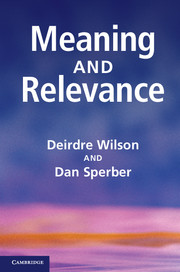Preface
Published online by Cambridge University Press: 05 June 2012
Summary
Preface
When Mary speaks to Peter, she has in mind a certain meaning that she intends to convey: say, that the plumber she just called is on his way. To convey this meaning, she utters certain words: say, ‘He will arrive in a minute’. What is the relation between Mary’s intended meaning and the linguistic meaning of her utterance? A simple (indeed simplistic) view is that for every intended meaning there is a sentence with an identical linguistic meaning, so that conveying a meaning is just a matter of encoding it into a matching verbal form, which the hearer decodes back into the corresponding linguistic meaning. But this is not what happens, at least in practice. There are always components of a speaker’s meaning which her words do not encode: for instance, the English word ‘he’ does not specifically refer to the plumber Mary is talking about. Indeed, we would argue that the idea that for most, if not all, possible meanings that a speaker might intend to convey, there is a sentence in a natural language which has that exact meaning as its linguistic meaning is quite implausible.
An apparently more realistic view is that the speaker typically produces an utterance which encodes some, but not all, of her meaning. Certain components of her meaning – in Mary’s utterance the referent of ‘he’ or the place where ‘he’ will arrive, for instance – are not encoded, and have to be inferred by the hearer; so while it might seem that a speaker’s meaning should in principle be fully encodable, attempts to achieve such a full encoding in practice leave an unencoded, and perhaps unencodable, residue.
- Type
- Chapter
- Information
- Meaning and Relevance , pp. ix - xiiPublisher: Cambridge University PressPrint publication year: 2012



